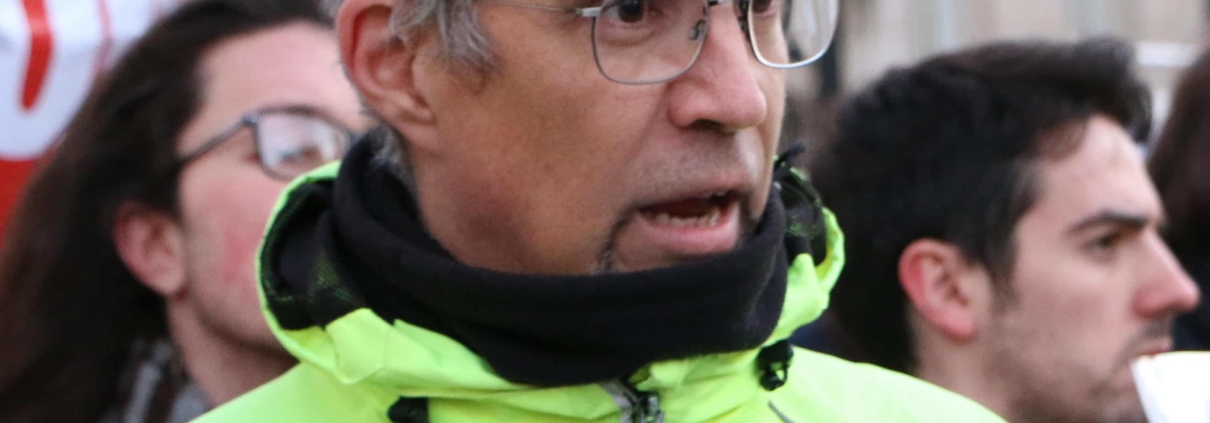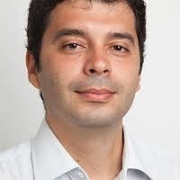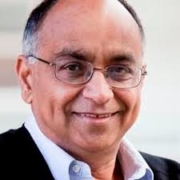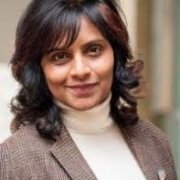Today we look at US imperialism in Venezuela. For the past 20 years, since Hugo Chavez was elected in 1998 in what is known as the Bolivarian revolution, the US has attempted to overthrow a democratically elected government. The US wanted to install a leader who supported its political and business interests. In January, the US put its full support behind Juan Guaido, a little known politician who became the self-described interim-president. But who is Juan Guaido and why was his rise nearly as fast as his fall?
My guest today is Jorge Martin, the secretary of the Hands off Venezuela campaign and a leading member of the International Marxist Tendency. He has followed the Bolivarian revolution for nearly twenty years, visiting the country often where he has been involved in the revolutionary movement, particularly the workers’ control and occupied factories experiences. In our conversation today, Jorge focuses on the many connections Juan Guaido has to various US institutions, from think tanks to philanthropic organizations, and to universities. Jorge makes clear that Juan Guaido was groomed through his education to take a leading role in the right-wing fight against the Bolivarian revolution. Guaido, in other words, is the latest figurehead in a class struggle supported by elite education in Venezuela and the USA.
Citation: Martin, Jorge, interview with Will Brehm, FreshEd, 148, podcast audio, April 1, 2019.https://www.freshedpodcast.com/martin/
Transcript, Translation, and Resources:
Will Brehm 2:40
Jorge Martin, welcome to FreshEd.
Jorge Martin 2:43
Hi.
Will Brehm 2:45
So earlier this year, Venezuela made the international news seemingly on a daily and nightly basis. I mean, the government of Nicolás Maduro was under siege by Juan Guaidó, who declared himself interim president in January. But by late March, when we’re recording, it seems like Guaido’s name is barely mentioned in the Western press. Can you give a quick overview of the last few months in Venezuela from Guaido’s seemingly fast rise out of nowhere to equally fast collapse?
Jorge Martin 3:18
Yes, what I have to say, first of all, is that what we’ve been witnessing in Venezuela in the last two months is an attempted coup, by the Washington Administration, to remove the democratically elected President of Venezuela, Nicolás Maduro. Nothing that’s happened in the last two months happened by chance. It was all pre-organized and planned in Washington. This person, Juan Guaidó, who was elected as the president of the National Assembly sometime in January had already been meeting with officials of the Trump administration in Washington and with people in the Lima Group of countries in December. And they’re the ones who told him what he had to do. And this was a pre-organized plan. So, on the 23rd of January, Juan Guaidó, at the street rally, declared himself the president of Venezuela and very quickly the US administration managed to get a whole series of countries in Latin America, in Europe, and the United States itself, to recognize him in that position. This was accompanied by a call for the army to intervene and side with Guaidó -recognize Guaidó as president and remove president Maduro and for Maduro to step down. So, this this was clearly an attempt to organize a military coup in a foreign country. But things didn’t go according to plan, even though the United States managed to get about 50 countries to recognize Guaidó, there was no movement in the Venezuelan army. There were no significant commanders with command of troops that defected. None of them, in fact. And even the opposition demonstrations, which were very big on the 23rd of January, itself then fizzled out. They were not very big anymore. And contrary to what the United States and the Venezuelan opposition thought, the Maduro government still had large reserve of popular support which was bolstered by the fact that this was clearly an imperialist attempt. And many people -tens of thousands, hundreds of thousands- came out on the streets of Venezuela over the last two months in different cities and localities to oppose imperialist intervention. So basically, this has been a bit of a flop. An attempted coup that really stalled and is losing momentum as we speak. In fact, there’s a funny angle to all this. You can see the media, for instance, Reuters originally called Guaidó, described Guaidó in the press releases as interim president, then they started to say he was the “self-proclaimed president”. Now they call him a Venezuelan engineer and that’s it. I mean, he no longer has an official title of any kind as far as the media is concerned. And some people in the US administration were very bothered about this. There was even a press conference by a person who is in charge of Western Hemisphere Affairs in the US State Department, who insisted that the media -by not calling Guaidó the interim president- they were giving in into the narrative of the “Maduro dictatorship” in inverted commas. So yes, it’s not going according to plan but that doesn’t mean that the plan has finished. There’s obviously still the angle of sanctions, economic sanctions which take some time to make their impact felt, and this is very serious. It’s a very serious attempt to remove the Venezuelan government. And it’s the culmination, I will say of 20 years of interference and attempts to smash the Bolivarian Revolution, which included already a coup in 2002, and many other. By any means necessary, they have tried to put an end to this experiment.
Will Brehm 7:15
So, if this has been a flop, what is Guaidó doing now? I mean, is he still the president of the National Assembly? What’s he doing in Venezuela now, after the flop of a coup?
Jorge Martin 7:30
Well, he still calls himself the interim president. But obviously, this is a practical thing. None of the orders that he gives to the army or civil servants are followed on. They are not fulfilled. So, he has no real power. But he is now, currently he is organizing series of street rallies in different cities, which have not been very successful. With the idea that then later on at some point they will march on the Miraflores Palace, which is the presidential palace, and they will take power. But in fact, the opposition is very weak, divided, and the opposition ranks are not very mobilized. They can see this is not working. And the only hope, from their perspective is a military intervention by foreign powers, led by the United States. But that is also not working because many of the Latin American countries -even right-wing governments, like Bolsonaro in Brazil, and Piñera in Chile, and others- they have said they’re not very keen on a military intervention. Not because they are democratic or they respect the will of the Venezuelan people but because they understand that this will be quite a complicated operation that called last in time, that will involve loss of life, and a high economic cost. So, they’re not very keen. So, at the moment, they are continuing with pressure, or some of the options. What they thought originally, which was this was going to be a quick operation. In a few weeks or a month, Maduro will be removed, the whole his government will crumble. This has not happened. So, they’re now in difficulties.
Will Brehm 9:10
So, one of the narratives that the press -the media in America, at least was- advancing was that Nicolás Maduro was an extreme dictator that was hurting everyday citizens in Venezuela and needed to be overthrown. Sort of a popular uprising and Juan Guaidó was the person to do this. How, in your opinion, is that narrative incorrect?
Jorge Martin 9:34
It’s not only incorrect, but it’s precisely the opposite of truth because they have said -the mass media and Washington have said- ever since President Chávez was elected in 1998, that President Chávez was a dictator, an authoritarian leader, the same things they said later on of Maduro. But in fact, if you look at the facts of the record, in 20 years, since 1998, there have been in Venezuela 24 or 25 different national elections. Elections for regional governance, elections for president. The Head of State in Venezuela is directly elected in an election. Elections for the National Assembly, referendums, constituent assemblies. You name it, they’ve had them. In fact, I will say they’ve had too many elections, that the whole of the political process has been dominated by different election contests. And all of those elections have been won by the supporters of the Bolivarian Revolution, with the exception of two. One was the constitutional amendment referendum, which was lost by Chávez. And he recognized the results. And then the National Assembly elections of 2015, which the opposition won by a big majority. And in this election, the results were also recognized. So, I mean, this is a very strange kind of dictatorship where there’s elections every year. And when the ruling party loses the election, they recognize the result. I mean, it doesn’t fit with the actual facts. But not only this, it is a matter of public record that the opposition, all of the opposition, all of the main parties of the opposition carried out an undemocratic military coup in 2002. So, they claim to be the democratic opposition, but in fact, they are the ones who disrupted the rule of law. They removed the democratically elected president in 2002 through a military coup. And when they came to power, they immediately abolished all democratic guarantees. In the speech that the coup president made, when he took power, they disbanded the National Assembly, they abrogated the Bolivarian constitution, they removed the state prosecutor. All the powers were canceled. And all of the parties of the opposition are involved in this. Juan Guaidó didn’t participate in the coup himself personally because he’s too young but his party, Popular Will, played a key role in the coup under another name. Popular Will didn’t exist at the time of the coup but Leopoldo López, the founder of the party, and all of the people involved in this party were part of a different party at that time which participated in the in the coup. There is a video of Leopoldo López participating in the coup. There’s a whole number of leaders of the Popular Will party that were part of this plot. So, in fact, what you have is the opposite. The Bolivarian Revolution has been extremely democratic always working through the legally established electoral processes and the opposition has on many occasions boycotted the elections tried to disrupt the elections, and at least in one case, carried out a coup. And at least in three occasions in the last 10 years they have attempted through violence, three demonstrations to overthrow the democratically elected government.
Will Brehm 13:02
So, it seems like the opposition is anything but democratic here. So, this podcast is primarily focused on education and media is certainly a big educational medium for people in their daily lives. But I want to actually look at Juan Guaidó and other members of the opposition and think through how they’ve been educated and their connections to various institutions. So, you know, where was Juan Guaidó educated?
Jorge Martin 13:31
Yes, the reason why they picked Juan Guaidó as the leader of the opposition is because, from a media perspective, and from the perspective of the story they built around him, he is quite a likable person. He, unlike many of the other opposition leaders, who are white, European and coming from an upper-class background. Juan Guaidó comes from a more humble background and has slightly darker skin, which coincides with the general makeup of the Venezuelan population more than any of the opposition leaders who all come from -in Venezuela there is a novel that is called Los Amos del Valle, The Owners of the Valley, and this explains the history – it’s a historical novel – it explains the history of the 60 or 100 families that have dominated Venezuela for the last 200 years since independence, the oligarchy. And all of the opposition leaders, they come from, they are related to one or the other of these families. Leopoldo Lopez is a very clear case. He is linked to the Mendoza family, who is a very wealthy family. Some of his ancestors go back all the way to Simon Bolivar and so these are very upper-class, elite people. But Juan Guaidó is slightly different, but he was also given the same education in elite institutions that many of the other opposition leaders. He comes from the state of Vargas, which is on the coast, north of Caracas. But he went to a private university, the Andrés Bello Catholic University of Caracas, which is a university of the ruling class. Where the sons and daughters of the ruling class are educated. And they are trained to occupy positions of power and privilege in society. But not only this, then he went to do some post-degree education at the George Washington University in the United States, which is also a private university. And he obviously was -either had the money for that, or he was funded to go. And over there, he studied under the tutelage of a Venezuelan economist, Luis Enrique Berrizbeitia, who is -I mean, you probably heard of the “Chicago Boys”, right? So, this is one of the “Chicago Boys”. He was not educated in the Chicago School of Business, but he is part of the same group of what you will say, neoliberal, capitalist economists. He worked for the IMF, and he worked for the Venezuelan oil company, before Chávez came to power. And so, you could say he was educated and prepared to play the role that he’s now playing. That’s his background, that’s his education. A very elite education which prepared him for the role that he is playing now.
Will Brehm 16:40
So, it seems like he’s been groomed almost his entire life. I mean, he’s quite young as well.
Jorge Martin 16:45
Yeah, that’s right. He has been prepared to play this role. And he was part of a generation of opposition students that in 2007, participated in a series of protests against the cancellation of the broadcasting license to RCTV, a private TV channel. And there were big protests at that time. RCTV was one of the main TV channels in Venezuela, which had participated directly in the organization of the coup in 2002. And so, when its license came up for renewal -in Venezuela as in many countries, the broadcasting licenses are public affair that is then granted to different companies- the government decided not to renew the license. And there were big protests over that. They said, “Well, this is a violation of freedom of expression”, and so on. And at that time, there was a generation of student leaders, many of whom then became leaders of the opposition. And this also didn’t happen by chance. There was also US involvement of this. Many of these student leaders, including Juan Guaidó, were trained by an organization called CANVAS, which is the Center for Applied Non-Violent Action and Strategies, and this is a group that is funded by US institutions, the National Endowment for Democracy, the National Republican Institute, and all the institutions like that which came out of the opposition student movement in Serbia, ‘Otpor!’. And basically, the idea is to use street protests and so on in order to remove regimes as they would put it. But as I said, this didn’t happen by chance. There has been a 20-year period of constant investment by US government and non-government agencies into the Venezuelan opposition. In training leaders, funding them so that they can have offices, they can have access to the media, and connections and so on. And Guaidó, is one of the results of this. Another one is, Yon Goicoechea, who is a guy who received a human rights prize in the United States worth half a million dollars. And he was also involved.
Will Brehm 19:04
Was this the one from the Milton Friedman Foundation or whatever?
Jorge Martin 19:08
I think it’s something related to the Cato Institute or something like this. They gave him a human rights prize, which was worth half a million. All of these people have been educated in US educational institutions. They’re all part of organizations. Like there was an organization called JAVU – [Juventud Activa de Venezuela Unida] – the United Venezuelan Active Youth. And this organization was created to replicate the model of Otpor! with US funding. The idea is to create “people’s power” in inverted commas movement that can overthrow a democratically elected government in this case, and provide the justification by this government is authoritarian, is repressing popular demonstrations and therefore should be removed. Anytime there is an imperialist intervention to remove a government that they don’t like, they always try to create a justification whether this be human rights, or democracy, humanitarian crisis in this case. So, this is what’s happening now is nothing new. They’ve been trying this several times in the last 20 years in Venezuela and Juan Guaidó, is one of the outcomes of this whole, carefully prepared campaign.
Will Brehm 20:45
What’s amazing is when you’re describing all of these different institutions and actors, you start realizing how there’s such a large network of US institutions, Venezuelan institutions, sort of working together to further the interests of say, you know, an imperial power like America, but also certain class interests in Venezuela. And one of the things that you said was that, Juan Guaidó was selected to be a leader because he came from more humble backgrounds. He didn’t look like these white elite class, even though he was in a way. The question I guess I have is, who selected him? How did that happen? Do we even know who selected him?
Jorge Martin 21:13
Well, we don’t know the actual details, but the footprints are all over it. It’s quite clear that for the last 20 years since Chávez’s rise to power in 98, and particularly since he enacted enabling laws in 2001, that there has been a concerted campaign by the Venezuelan oligarchy -that is the owners of the media, the owners of banks, land owners, capitalists and so on- which are closely linked to US imperialist interests to put an end to this Bolivarian Revolution. And Juan Guaidó is one of the means that they have used but they have used many over the last 20 years. And some of their leaders have been bumped out by the experience, some others have gone abroad, and some have failed miserably like Pedro Carmona, who fronted the coup in 2002. But it’s quite clear that this is coming from the United States in conjunction with the Venezuelan oligarchy. And why is this? Because the Bolivarian Revolution -for all its faults and shortcomings- represents a genuine attempt to put the interests of the people first, of the majority of the people first, and to use the oil resources of the country, which is a very rich, wealthy country, at the service of social programs that benefit the majority of society. The workers, the poor, the peasants, and so on. And not only this. This is one part of it. But the other part is the Bolivarian Revolution represents genuine attempt of working people to take control over their lives. There has been very widespread experience of workers control, of community organization, of land agrarian reform. And this is as someone said once, “the threat of a good example”. At a certain time 10 years ago, this was an example to follow by many other Latin American countries. And so for over 100 years, the United States ruling class has considered Latin America to be its backyard, through the Monroe Doctrine, they said America for the Americans, which basically meant that all of the American continent should be dominated by the US ruling class and they could not accept this should be happening in their backyard and of course, they’ve attempted on several occasions to put an end to the Bolivarian Revolution. To smash it. And to smash this good example, which was threating to spread to other countries.
Will Brehm 23:48
So, this is very much a class struggle?
Jorge Martin 23:51
Yes, it is. It is a class struggle. Inside Venezuela, you can see. For 20 years, if you examine the voting patterns in a city like Caracas, you will see that there are working class areas, like Antimano, which have voted consistently for 20 years, 75 or 80% for the Bolivarian Revolution. And then you go to other places, upper class and middle upper-class areas in the east of Caracas like El Hatillo in Baruta, and they have voted consistently 80% for the opposition. It is a very clear class division inside Venezuela and this obviously is replicated in the United States. In the United States, there has been a lot of support for the Bolivarian Revolution. And the Bolivarian Revolution at one point, it instituted a number of social programs. We were helping people in the South Bronx, for instance, and so on. But at the same time, the ruling class in the United States -be through Democratic or Republican administrations- has attempted to overthrow and put an end to this government which is scandalous if you think about what’s been happening in the United States, in the last two or three years. There’s been a big “hoo-ha”, a big scandal, about Russian interference in the US elections. But in fact, we’re talking here, about 20 years of the US administration funding opposition groups. We’re talking about tens of millions of dollars of funding for opposition groups in Venezuela. Just imagine if Venezuela was funding opposition groups in the United States. Or if Russia was funding opposition groups in the United States, or any other foreign power was interfering in such a way in the US elections. It’ll be a big scandal. But obviously, in this case, this is disguised and justified by the media, by talk of an authoritarian government, human rights, humanitarian crisis, and you name it, they’ve invented the justification.
Will Brehm 25:49
So, you call for a mass campaign in the streets and a mass education campaign amongst students and workers to sort of change this dynamic of US imperialism in Venezuela. What would that look like? In your opinion? How could that start, and what effect might it have? Give us some more detail behind this idea of a mass movement.
Jorge Martin 26:13
I think for people in the United States, the main task, or the main thing that they should do in relation to Venezuela is to oppose the imperialist designs of their own government. Just to give you one example, there was a very high-profile case on the 23rd of February. It was like D-Day for the opposition. They wanted to bring in humanitarian aid, they said. The United States had been stockpiling so-called humanitarian aid in Cúcuta, which is in Colombia, in the border with Venezuela. And on that day, they tried to force this aid through the border. There is a bridge, Santander Bridge, and by the end of the day, one of the aid trucks was set on fire and burned down. And the whole of the media and the US administration officials said that it had been the Venezuelan -Maduro set fire to this humanitarian aid, which is completely scandalous thing. And some even said this goes against the Vienna Convention of war crimes, and that this provided justification for military intervention and so on. But then later on two, three weeks later -at that time, we said this is a lie. This is not true. It was actually opposition rioters throwing Molotov cocktails that accidentally set fire to one of these trucks. But two or three weeks later, there was a report in the New York Times that they’ve been looking at the evidence, video evidence and so on and they determined this was the case: It was not the Maduro government authorities that had set this truck on fire, but it was the opposition rioters throwing an incendiary bomb that had set the truck on fire. Now, if they lied to you about that question, can you trust anything they say about Venezuela? So, the first thing is to be extremely critical. To analyze critically anything that the media and the US spokespersons say about what’s happening in Venezuela because they have a vested interest in removing these governments. So, they will not stop at lying. I mean, they did lie to justify the war in Iraq. They said there were weapons of mass destruction, there was an imminent threat. And that was then proven to be a straight lie. So, when it comes to imperialist intervention, we need to question the motives and what they say. Secondly, you need to think about this in the following terms: the same ruling class in the United States that is denying the people of the United States of a decent minimum wage, that is denying them a decent free, universal health care, that is denying them free education, that is cutting out policies that are not in their benefits, this is the same ruling class that is intervening in Venezuela. And therefore, if you are suspicious of their motives or you oppose their motives in internal and home policy, you should also question their motives in foreign policy and this is what needs to be explained. Obviously, it is an uphill battle because of the domination of the mass media. But at the same time, because people are already suspicious of what the establishment tells them, or what the ruling class tells them, there is an avenue for also exploring the fact they are lying. That their motives are not what they say they are. I mean, for instance, John Bolton said openly that what he wanted to see was a situation where the oil reserves of Venezuela were exploited, the oil was extracted by US companies. So, this is the reason. This is one of the reasons at least. The other reason is they want to put an end to a revolutionary process. Why the US intervening there? And this needs to be explained. And there needs to be a campaign of demonstrations, pickets, but also public meetings, education, mass propaganda, to explain these very simple things and to respond and answer to every single one of the lies that they are using in order to justify this foreign intervention. But I think the terrain is fertile because in the US, amongst the US public, working people in the US are already suspicious of the motives of the ruling class in the United States. They already realized that they were lied about in relation to Iraq and Afghanistan, that is a very costly foreign military adventures that have cost the US people dearly in terms of money and loss of life, and have not achieved any of their aims. So, people are already suspicious of this idea of foreign military interventions. And this can be used to clearly explain this is what’s happening. In Venezuela, the government attempted with more or less success, to provide people with free health care for all, free education for all up and including university education. It was a massive improvement of the living standards of the people and this is what the people of the United States also would like to see in the United States.
Will Brehm 31:20
So, it seems like there’s a lot that the US could learn from Venezuela.
Jorge Martin 31:23
Definitely. Yes.
Will Brehm 31:24
Well, Jorge Martin, thank you so much for joining FreshEd. It really was a pleasure of talking today.
Jorge Martin 31:29
Okay. It was my pleasure.
Want to help translate this show? Please contact info@freshedpodcast.com
Have any useful resources related to this show? Please send them to info@freshedpodcast.com
US Imperialism and Education: The Case of Venezuela










